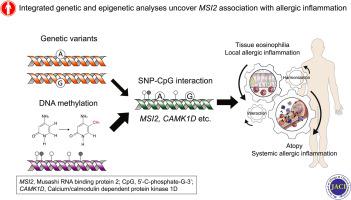Journal of Allergy and Clinical Immunology ( IF 11.4 ) Pub Date : 2020-08-11 , DOI: 10.1016/j.jaci.2020.06.040 Kyung Won Kim 1 , Sang-Cheol Park 2 , Hyung-Ju Cho 3 , Haerin Jang 1 , Jaehyun Park 4 , Hyo Sup Shim 5 , Eun Gyul Kim 1 , Mi Na Kim 1 , Jung Yeon Hong 1 , Yoon Hee Kim 6 , Sanghun Lee 7 , Scott T Weiss 8 , Chang-Hoon Kim 3 , Sungho Won 9 , Myung Hyun Sohn 1

|
Background
The relationship between allergic and eosinophilic inflammation, either systemic or local, in allergic diseases remains unclear.
Objective
We performed combined genome-wide association study (GWAS) and epigenome-wide (EWAS) for atopy and tissue eosinophilia to identify both genetic and epigenetic signatures between systemic and local allergic inflammation, and to capture global patterns of gene regulation.
Methods
We included 126 subjects for atopy analysis and 147 for tissue eosinophilia analysis, as well as 18 normal nasal tissue samples. We identified differentially methylated positions (DMPs) and genes associated with atopy and tissue eosinophilia. Furthermore, we performed mendelian randomization analysis and penalized regression along with replication in an independent cohort.
Results
EWAS identified genes, including Musashi RNA binding protein 2 (MSI2), associated with atopy, which contained enriched DMPs that genetically affect atopy. A direct association was observed between MSI2 single-nucleotide polymorphisms and atopy, as was a causal effect of changes in MSI2 expression and methylation on atopy, which was replicated in a Costa Rican population. Regarding tissue eosinophilia, EWAS identified genes with enriched DMPs directly contributing to tissue eosinophilia at the gene level, including CAMK1D. The gene ontology terms of the identified genes for both phenotypes encompassed immune-related terms.
Conclusion
EWAS combined with GWAS identified novel candidate genes, especially the methylation of MSI2, contributing to systemic allergic inflammation. Certain genes displayed a greater association with either systemic or local allergic inflammation; however, it is expected that a harmonized effect of these genes influences immune responses.
中文翻译:

综合遗传和表观遗传分析揭示了 MSI2 与过敏性炎症的关联
背景
过敏性疾病中全身或局部的过敏性炎症和嗜酸性粒细胞炎症之间的关系仍不清楚。
客观的
我们针对特应性和组织嗜酸性粒细胞增多症进行了全基因组关联研究 (GWAS) 和表观基因组范围 (EWAS) 的联合研究,以确定全身性和局部过敏性炎症之间的遗传和表观遗传特征,并捕获基因调控的全球模式。
方法
我们纳入了 126 名受试者进行特应性分析,147 名受试者进行组织嗜酸性粒细胞增多症分析,以及 18 份正常鼻组织样本。我们确定了差异甲基化位置 (DMP) 和与特应性和组织嗜酸性粒细胞增多相关的基因。此外,我们在独立队列中进行了孟德尔随机化分析和惩罚回归以及复制。
结果
EWAS 鉴定了与特应性相关的基因,包括 Musashi RNA 结合蛋白 2 (MSI2),其中包含对遗传性影响特应性的富集 DMP。在MSI2单核苷酸多态性和特应性之间观察到直接关联,MSI2表达和甲基化变化对特应性的因果影响也是如此,这在哥斯达黎加人群中得到了复制。关于组织嗜酸性粒细胞增多,EWAS 鉴定了富含 DMP 的基因,这些基因直接导致基因水平的组织嗜酸性粒细胞增多,包括CAMK1D。两种表型的已识别基因的基因本体术语包括免疫相关术语。
结论
EWAS 与 GWAS 相结合确定了新的候选基因,尤其是MSI2的甲基化,有助于全身性过敏性炎症。某些基因与全身或局部过敏性炎症表现出更大的关联;然而,预计这些基因的协调作用会影响免疫反应。











































 京公网安备 11010802027423号
京公网安备 11010802027423号